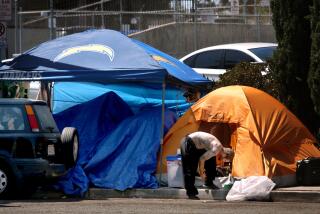Ruling on Arraignments and Jail Visits Upheld
- Share via
SAN FRANCISCO — The state Supreme Court on Thursday rejected an attempt by Los Angeles officials to overturn an appellate ruling that requires the city to speed the arraignment of arrested prisoners and allow them visits from family and friends at the jail.
The court, in a brief order, left intact a decision, issued on May 4, by a state Court of Appeal that found the Los Angeles Police Department had violated the civil rights of arrestees by holding them too long before court appearances and under conditions in which they were deprived of basic needs.
Only Chief Justice Malcolm M. Lucas and Justice Edward A. Panelli voted to hear the city’s appeal, two votes short of the required number for review. Justice John A. Arguelles did not participate.
An attorney for the city expressed disappointment with the action, saying the lower-court ruling will be “extremely costly,” perhaps requiring millions of dollars in added personnel and construction to implement, and could deny authorities the time they need to investigate the cases of detained prisoners.
“We will have to substantially modify the way the jails are set up for visits,” Deputy City Atty. Linda K. Lefkowitz said. “We will conform with the ruling, but it will be a big drain on the taxpayers and not benefit arrestees.”
Attorneys for the American Civil Liberties Union of Southern California, which brought the suit, were unavailable for comment.
The suit, a class-action brought in 1977, charged that arrestees were being held in excess of the two-day limit set under state law before being brought to court for arraignment, exclusive of Saturdays, Sundays and holidays.
Judge’s Determination
In such court appearances, a judge determines whether there is sufficient evidence to proceed with the charges. Police and prosecutors make use of the time between arrest and arraignment to interview witnesses and victims to prepare for the cases.
The LAPD interpreted the law to mean arraignment within 48 hours, which, because of closing times of courts, sometimes meant arrestees were held into a third day. Such a policy is followed by most other major police agencies in the state.
In 1983, Los Angeles Superior Court Judge Harry L. Hupp, now a federal judge, ordered the Police Department to make sure prisoners are arraigned in the second calendar day they are in custody; provide for daily showers and shaves and reading materials and recreational facilities, and lift a ban on jail visits.
The Court of Appeal, in a 2-1 vote, upheld Hupp’s ruling.
“The trial court’s orders may be inconvenient, may require more detectives, may require more deputy district attorneys and may require more cooperative efforts between police and prosecutors,” the court said in an opinion by Los Angeles Superior Court Judge David M. Rothman, sitting by assignment. “But . . . holding thousands of unarraigned arrestees for an extra day is not constitutionally acceptable.”
In dissent, Appellate Justice Ronald M. George said that while many of the changes ordered by the court might be “socially desirable,” they should be accomplished legislatively, “rather than by judicial decree.”
More to Read
Sign up for Essential California
The most important California stories and recommendations in your inbox every morning.
You may occasionally receive promotional content from the Los Angeles Times.













